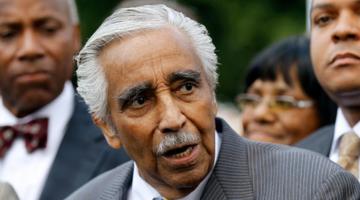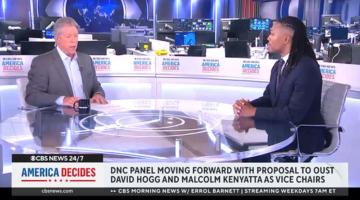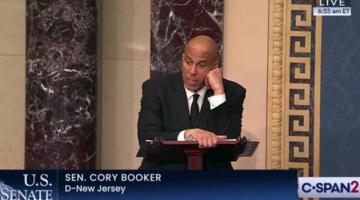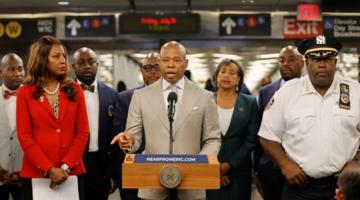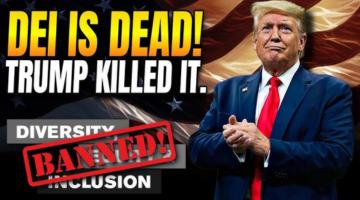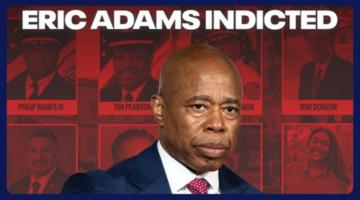Black Democratic Party operatives seek to camouflage class antagonisms among African Americans and to equate racial progress with the feeble policies of “diversity and inclusion.”
“Black poor and laboring folk need to escape the clutches of Democratic Party hucksters while restoring their own agency and will to fight.”
Anyone who knows [African Americans], who knows their history…must recognize that…the hatred of bourgeois society and the readiness to destroy it when the opportunity should present itself, rests among them to a degree greater than in any other section of the population in the United States. — C. L. R. James, 1948
Are African Americans still among the most progressive groups in the United States?
Black America’s fierce commitment to an egalitarian vision of socioeconomic justice once earned the admiration of people around the world.
The central thrust of the 20th century black liberation struggle was a grassroots demand for social and economic redistribution that promised to empower all poor and laboring people.
On some level, the African American masses have long recognized capitalism as a fundamental obstacle to their freedom. Poll after poll continue to identify black people as among the nation’s staunchest advocates of robust social spending and the placing of strong constraints on capitalism’s tendency to produce inequality.
In essence, what the Caribbean Marxist C. L. R. James said of black folks in the wake of World War Two remains true today.
“African American masses have long recognized capitalism as a fundamental obstacle to their freedom.”
But how do we reconcile the tradition of principled African American resistance to capitalist oppression with the apparent support of older black voters for corporatist, neoliberal politicians like Joe Biden? If black America’s political sensibilities skew left, why does its voting majority hew to the center?
The answer lies in the complexities of African American life and thought. Despite the reductionist narratives about “the black vote” that circulate in mainstream media, black communities contain profound political contradictions.
Yes, younger African American voters have proven far more receptive than have their parents to the populist, social democratic themes of Bernie Sanders. But the political cleavages within black America go well beyond the generational divide. To grasp the paradox of African American voting behavior, one must examine the veiled dynamics of class and ideology.
Throughout U.S. history, the black working-class has played a leading role in popular struggles to transform the capitalist economy and construct a more humane order. The black masses stood to benefit dramatically from the wholesale reorganization of a system that reduced their ancestors to chattel while continuing to consign racialized groups to the social margins.
“The political cleavages within black America go well beyond the generational divide.”
But black Americans were never universally hostile to the capitalist model. For some African Americans, the greatest fault of bourgeois society was not its subjugation of black workers but its failure to fully include nonwhite elites in its upper echelons. The black professional and entrepreneurial classes have always produced a corps of strivers who were far more interested in achieving individual status than they were in seeking collective black advancement.
Such figures were immensely valuable to the white bourgeoisie. As moderate politicians, clergy and race leaders they often served as buffers, policing African American working-class behavior and prescribing respectability. As fervent antiradicals they pursued narrow racial reforms while helping blunt or suppress militant black crusades for full employment, unionization and the substantial reallocation of wealth and power.
Today’s black Democratic Party insiders are the functional equivalents of such “responsible Negro leaders” of the past. Whether they are formal politicians (e.g. Corey Booker, Kamala Harris and Obama) or mere functionaries, their job is to manage the African American rank and file on behalf of the corporate establishment, primarily by consolidating a centrist black voting bloc within the Democratic Party.
“The black professional and entrepreneurial classes have always produced a corps of strivers who were far more interested in achieving individual status than in seeking collective black advancement.”
An array of black bureaucrats use their influence to help confine African American electoral politics to the soft ideological middle, ensuring that widespread black aspirations for a fair and just society never seriously threaten the prerogatives of private wealth. Black Democratic Party operatives seek to camouflage class antagonisms among African Americans; to equate racial progress with the feeble policies of “diversity and inclusion”; and to reject even modest forms of class struggle as detached from or inimical to an authentic black political identity.
It is hardly surprising that the layer of black professionals, pundits and preachers who gain prestige and patronage by serving the interests of Wall Street played a conspicuous part in anointing Biden as the “safe” choice for African Americans.
Sure, there are plenty of black voters who are genuinely wary of or opposed to the anticapitalist ideals of Sanders. But there are many more African Americans who yearn to restore the commons, institute universal healthcare, and impose firm restraints on the capitalist class. They want a politics that offers not just window dressing but actual antiracist positions on policing, criminal justice and immigration.
“There are many more African Americans who yearn to restore the commons, institute universal healthcare, and impose firm restraints on the capitalist class.”
The problem is that even when such progressives manage to escape voter suppression and other forms of disfranchisement, they often operate within institutional and church networks that bind them to black elites and enlist them in bourgeois programs of class collaboration.
Combine that reality with the severe alienation from formal politics that exists among much of the black dispossessed and what you get is a chastened and compliant African American electorate, a polity acclimated to the empty symbolism of racial representation, desiring peace yet complicit with U.S. empire and its wars of domination, and forced to accept self-sacrifice as the price of participation in the Democratic Party machine.
The illusion of pragmatic centrism distorts not only African American electoral patterns, but also black political consciousness itself. The manufacturing of a moderate black consensus and the virulent racism of Trump and his ilk drive black workers into self-destructive alliances with plutocrats and other class enemies. With “politics” reduced to rituals of clientage, no wonder so many members of the black laboring classes recoil in bitterness, withdrawing into atomized worlds of individual survival.
“What you get is a chastened and compliant African American electorate, a polity acclimated to the empty symbolism of racial representation.”
But neither resignation nor accommodation can protect the African American grassroots. What black poor and laboring folk truly need is an organizational base for challenging the ideological hegemony of moderate black Democrats. They need mechanisms for overcoming the inertia of centrism and the anemia of brokerage politics. They need to escape the clutches of Democratic Party hucksters while restoring their own agency and will to fight.
Ultimately, black workers—like all workers—need a bona fide labor party. In the short term, however, African Americans who wish to transcend the petty bourgeois agenda of the black political class must seize every opportunity to shift the balance of forces and promote a meaningful program of social provisions able to change the conditions of life at the bottom.
To that end, the Sanders campaign may prove useful. Even as it founders on the apprehensions of a leery black electorate, the Sanders movement has championed a set of reforms based on principles of fairness and redistributive justice that are deeply rooted in the philosophies of the African American rank and file. Whoever finally emerges as the Democratic nominee, the struggle for Medicare for All and a Green New Deal has revitalized an ethic of prophetic dissent that has long found rich expression in the black radical tradition.
“The Sanders movement has championed a set of reforms based on principles of fairness and redistributive justice that are deeply rooted in the philosophies of the African American rank and file.”
The basic political aspirations of most everyday black people are not mysterious or exotic. Like many of their compatriots, the majority of African Americans long to live with dignity in a peaceful society free of systematic exploitation, discrimination and brutality. Biden’s strong showing among African American voters does not signal broad black support for the center-right policies of the Democratic establishment. The black masses are far from satisfied with the dystopia of late capitalism.
Black people cannot afford to accept a rebranded version of the austerity they have long endured. They must reject the bankrupt tendency in African American politics that ingratiates itself to the more cosmopolitan, less overtly racist wing of the ruling class. Life under a neoliberal regime run by urbane oligarchs (Obama’s cronies) may be marginally more bearable than life under a neoliberal regime run by vulgar bigots. But in the long term, neither scenario will ensure our survival or that of other oppressed people.
As black workers and poor people build political confidence, combat fatalism and reject moderation, no doubt they will expand the horizon of popular expectations, sharpen the tools of class confrontation and mobilize around their concrete interests within and beyond the electoral arena.
Russell Rickford is an Associate Professor of History at Cornell University. He is author of We Are an African People: Independent Education, Black Power, and the Radical Imagination (Oxford, 2016)
COMMENTS?
Please join the conversation on Black Agenda Report's Facebook page at http://facebook.com/blackagendareport
Or, you can comment by emailing us at comments@blackagendareport.com




